What to do if eggplants are not tied in the open field and why it happens
Eggplants are whimsical plants. They are grown in greenhouses and outdoors. Without creating optimal conditions, eggplants stop developing and growing fruit. Lack of ovaries is the main problem that needs to be quickly resolved. Some believe that the plants do not have enough heat, others that there is a lot of nitrogen in the soil. The answer to the question why eggplants are not tied in the open field can be found in our article.
The content of the article
What is an ovary and what is it for
The ovary is the formation at the bottom of the pistil. It protects the ovules from the negative effects of the environment, additionally maintains the moisture of the seeds, and helps them withstand temperature changes and pest attacks.
The reasons for the absence of ovaries, falling off and lack of fruit in eggplants
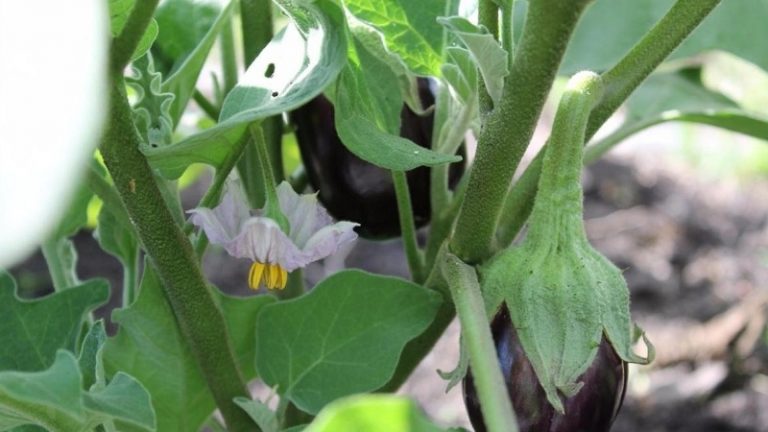
Often due to color drop ovaries are not formed. Sometimes the plant grows and blooms, but there are too few or none at all. Let's consider the main reasons why eggplant has no ovaries.
Temperature violation
A favorable temperature for plants is from +25 to + 27 ° С. If it is below + 15 ° C, growth slows down with subsequent shedding of color. Such temperature drops occur after placement of seedlings in the open field and a sharp cold snap. Eggplants do not die, but the color and ovaries fall off.
Hot summers are bad for plants. At temperatures above + 32 ° C, the pollen becomes sterile, and the barren flowers on the eggplant fall off. This is the case when the crop is grown in a poorly ventilated greenhouse.
Reference. Eggplant is a capricious plant that does not tolerate stress. In the presence of constant drafts or sudden changes in temperature, ovaries are not formed on it.
Improper watering
Eggplants are moisture-loving plants, so they die due to lack of water. They require timely watering, since the leaves instantly evaporate moisture. When fruit sets and grows, soil moisture should be 75-80%. Drying out the soil and watering with cold water leads to the dropping of ovaries and color.
Excess nitrogen
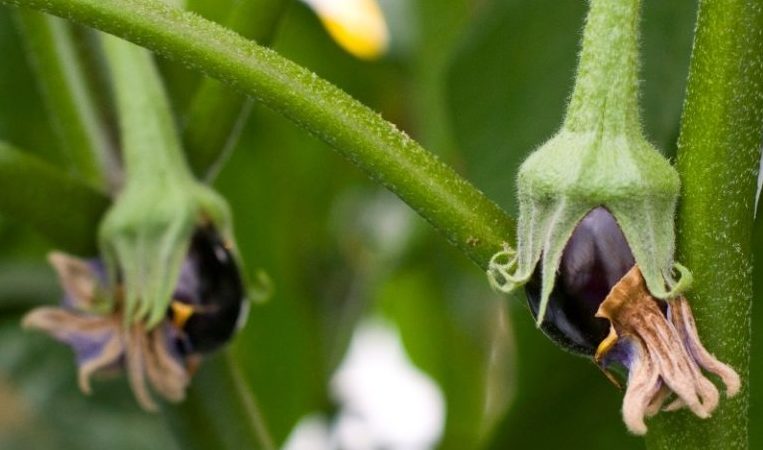
Nitrogen is an irreplaceable fertilizer for seedlings and crop development. Before flowering eggplant, its amount is reduced, and potassium and phosphorus are increased.
Important! An excess of nitrogenous fertilizers causes an increased growth of green mass and a lack of flowering. If a color appears on the plants, it will remain without an ovary.
Excess pollen
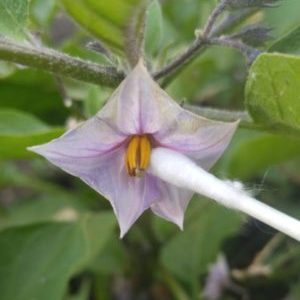
Many eggplant varieties are self-pollinated - the flowers are bisexual. But sometimes too much pollen is formed, which leads to its sticking together. This phenomenon is observed in a greenhouse with a humid environment. That is why eggplants bloom, but there are no ovaries. Experienced gardeners recommend pollinating the plant with a regular brush.
Lack of fertilizer
Plants love nutritious and light soil. Mineral deficiency causes the absence of ovaries. Lack of phosphorus, boron or magnesium negatively affects the culture.
Close fit
The thickening of the planting prevents the penetration of sunlight to the ovaries. A strong shadow causes the plant to shed them.
Unsuitable soil
Plants prefer fertile and well-drained soil with neutral acidity. Dense, acidic and poorly heated soils interfere with the formation of fruits.This often happens in the presence of loamy and podzolic soils.
How to fix these problems
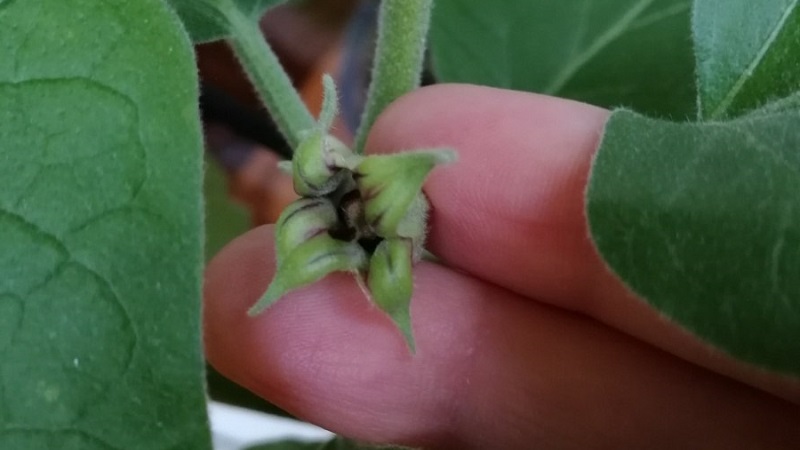
Tips:
- Apply drugs. If the eggplants do not form ovaries, they are sprayed or watered with "Bud", "Gibbersib", "Epin". These products contain phytohormones that make plants grow and develop well.
- Pay attention to the amount of fertilizer used... If there is a lot of nitrogen in the soil, potash and phosphorus components are added. With a deficiency of boron or magnesium, the bushes are sprayed with a complex solution. Recipe: 1 g of boric acid is dissolved in 1 l of water, diluted with 10 l of water and 1 g of magnesium sulfate is added. Feeding eggplant with drugs "Agricola" or "Kemir".
- In the presence of pests, the plant is treated with "Confidor" and "Strela"... Insects damage the buds, resulting in the absence of ovaries.
- Peduncles on self-pollinated eggplants are gently shaken... Self-infertile pollinated by hand with a brush.
- They control and regulate the air temperature. During the day, the greenhouses are ventilated, and at night they are closed.
- Water the plants abundantly and in a timely manner - 2 times a week, 2 liters per bush in the absence of precipitation. Use only warm water - cold water inhibits the development of the bush.
Preventive measures and advice from experienced agronomists
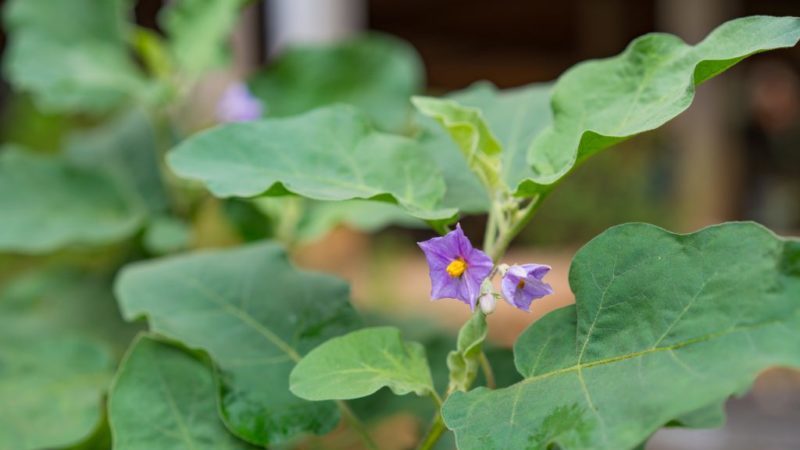
Experienced gardeners recommend adhering to the following rules:
- Check the soil. For landing choose a light and fertile soil with a neutral reaction. If the plants are planted in greenhouses, prepare a mixture of 1 part turf and 2 parts humus.
- Choose the right place. It should be well warmed up by the sun. In the shade, the culture will not bear fruit.
- Comply with crop rotation... Eggplants are not planted after tomatoes, potatoes, physalis.
- Use high quality seed material. For this, zoned varieties are selected. The planting material is processed for the prevention of various diseases.
- Form bushes... Remove bad ovaries and leaves that interfere with buds.
- Tear off the yellow leaves and the remains of the corolla from the flower. Otherwise they will cause the fruit to rot.
- The recommended temperature regime is set. When the temperature drops at night, a covering material is used. Greenhouses are aired daily, and in hot weather they cool the green mass by surface irrigation.
- Plants are watered once a week, in the heat - 2 times. For 1 sq. m area is poured about 40 liters of water.
- Loosening the soil and removing weeds regularly... Try not to damage the root system.
- Top dressing is applied 3 times during the growing season. Nitrogen fertilizers are used 14 days after the appearance of plants, during the flowering period - complex fertilizers, during the fruiting period - phosphorus-potassium fertilizers. It is good if the products contain macro- and microelements.
Experienced gardeners recommend choosing the right eggplant varieties for cultivation in a specific region. The best of them are:
- Almaz - for all regions of Russia;
- Banana - for central Russia, the Urals and Siberia;
- Epic F1 - for the southern regions;
- Black handsome - for regions with cold climates.
To obtain high-quality soil, phosphorus-potassium fertilizers are introduced in the fall. The site is being dug up. In the spring, the procedure is repeated, but without fertilization.
Conclusion
If the eggplant drops flowers, and the ovary falls off, it means that it lacks high-quality fertilizers or an unfavorable microclimate has been created. You can eliminate such problems if you follow the recommendations and advice, as well as properly care for the culture from the moment the seedlings appear.
For stable fruiting, it is imperative to choose zoned varieties, monitor the air temperature and soil moisture, consistently water the beds, fight pests, apply fertilizers at different stages of growth.